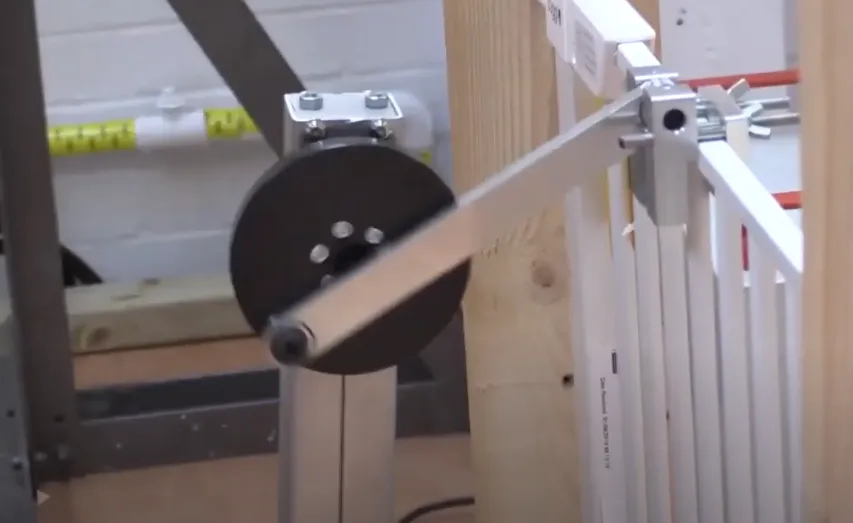BS EN 1728 Furniture Mechanical Load Testing for Children’s Products
The British Standard (BS) and European Norm (EN) standard BS EN 1728 is a crucial document in the furniture industry, particularly concerning products intended for children. This standard ensures that furniture designed to be used by infants and young children meets strict mechanical load requirements to prevent accidents such as breakage or collapse under normal use conditions.
The primary goal of this testing is to protect the safety of children who may interact with furniture in various ways, including climbing on it, using it for seating, or even sleeping near it. Compliance with BS EN 1728 helps manufacturers ensure their products meet legal requirements and industry best practices, thereby safeguarding consumer health and well-being.
Under the scope of this standard, mechanical load testing covers several critical aspects, including but not limited to:
- Bending strength
- Torsional resistance
- Shear stability
- Edge impact resistance
- Pull-out resistance for drawers and doors
These tests are conducted using specific instrumentation that applies controlled loads to simulate real-world stress scenarios. The purpose is to determine if the furniture can withstand these forces without compromising structural integrity or posing a risk of injury.
The acceptance criteria outlined in BS EN 1728 specify exact values for maximum allowable deflections, stresses, and other parameters. Manufacturers must ensure their products meet all specified limits during testing to pass this standard successfully.
For R&D engineers and quality managers involved in product development, understanding the nuances of BS EN 1728 is essential. This knowledge enables them to design safer furniture while adhering to regulatory standards, thus protecting both children and the wider public from potential hazards associated with poorly manufactured or designed products.
Incorporating rigorous mechanical load testing into the production process not only enhances product safety but also supports broader corporate social responsibility goals by reducing incidents involving children. By investing in thorough compliance measures like those prescribed in BS EN 1728, businesses demonstrate their commitment to safeguarding young lives while maintaining high standards of craftsmanship and innovation.
Benefits
Compliance with BS EN 1728 brings numerous advantages for manufacturers and retailers. Firstly, it ensures that your products meet stringent safety requirements set by regulatory bodies across Europe, enhancing brand reputation and trust among consumers. Secondly, successful certification can open up new markets where adherence to these standards is mandatory.
Additionally, companies that demonstrate commitment to quality through rigorous testing like this are likely to experience increased sales due to higher customer confidence levels. Moreover, investing in such tests helps prevent costly recalls or legal actions resulting from product failures leading to injuries.
From an operational perspective, consistent adherence to these standards can streamline supply chain management by providing clear guidelines on what is expected at every stage of production. This leads to more efficient processes and reduced errors throughout the manufacturing cycle.
The long-term benefits extend beyond immediate market opportunities; they contribute positively towards sustainable business practices fostering a culture of continuous improvement within organizations.
Eurolab Advantages
At Eurolab, we pride ourselves on offering comprehensive testing services tailored specifically to meet the needs of our clients operating in diverse sectors. Our expertise lies not only in providing accurate results but also ensuring that these are delivered efficiently and cost-effectively.
- State-of-the-art facilities: Equipped with advanced equipment capable of replicating real-world conditions accurately, allowing for precise measurement and analysis.
- Experienced professionals: Our team comprises highly qualified technicians who understand both the theoretical underpinnings and practical applications of various standards including BS EN 1728.
- Fast turnaround times: We recognize that timely delivery of reports is crucial for business continuity. Therefore, we strive to minimize delays while maintaining high-quality outcomes.
- Comprehensive support: Beyond just performing tests, our consultants offer valuable advice on how best to interpret results and implement improvements based on those findings.
By choosing Eurolab for your mechanical load testing needs related to children’s furniture products under BS EN 1728, you gain access to a network of resources dedicated solely towards helping businesses succeed in their respective fields.
Environmental and Sustainability Contributions
Incorporating rigorous mechanical load testing into your production processes aligns with broader sustainability goals by promoting responsible resource use. By ensuring that only robustly constructed furniture passes our tests, we help minimize waste generated from broken or unsafe items reaching end users.
- Reducing material consumption: Accurate testing helps identify optimal component specifications needed for durability without over-engineering which wastes resources.
- Promoting recycling: Safe products that do not need replacement frequently contribute positively to circular economy principles.
- Eco-friendly manufacturing practices: Ensuring sustainable sourcing and reduced energy consumption during production aligns with global efforts towards greener industries.
The commitment to sustainability extends beyond just the physical attributes of the furniture; it encompasses all aspects from design conception through final disposal. By participating in rigorous mechanical load testing under BS EN 1728, you contribute significantly towards creating a more sustainable future for generations to come.





